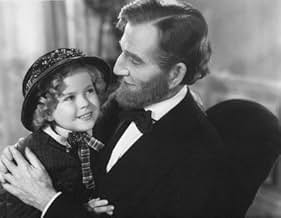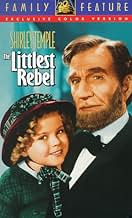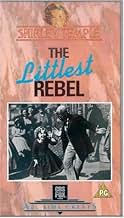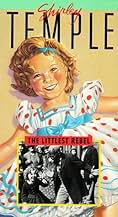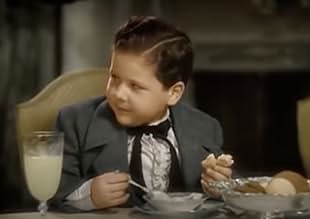Aggiungi una trama nella tua linguaShirley Temple's father, a rebel officer, sneaks back to his rundown plantation to see his family and is arrested. A Yankee takes pity and sets up an escape. Everyone is captured and the off... Leggi tuttoShirley Temple's father, a rebel officer, sneaks back to his rundown plantation to see his family and is arrested. A Yankee takes pity and sets up an escape. Everyone is captured and the officers are to be executed. Shirley and "Bojangles" Robinson beg President Lincoln to interc... Leggi tuttoShirley Temple's father, a rebel officer, sneaks back to his rundown plantation to see his family and is arrested. A Yankee takes pity and sets up an escape. Everyone is captured and the officers are to be executed. Shirley and "Bojangles" Robinson beg President Lincoln to intercede.
- Regia
- Sceneggiatura
- Star
- Premi
- 4 vittorie totali
- Sgt. Dudley
- (as Guinn Williams)
Recensioni in evidenza
Yes, Willie Best's character is an embarrassment when it is not infuriating. There's no arguing that.
But Bill Robinson's character is very different. He is the one on whom Mrs. Cary relies when her husband is at war, he is the one who makes it possible for Cary to get back to see his wife as she is dying, etc. He is also the one who makes it possible for he and little Virgie to get to Washington and, eventually, plead her father's case with President Lincoln. In short, he is the character who makes pretty much everything good happen.
Yes, there is injustice in that he should have received higher billing as a result, and he should have been in the final shot with Temple, as he was as important as her father and more important than Jack Holt. That was unfair, and though probably based on what Fox thought American audiences of the time would tolerate, nonetheless a concession to the racism of the time. But for its time, this movie is remarkably devoid of the "dumb and happy darkie" stereotypes of the time that are so infuriating.
Furthermore, little Virgie never once treats "Uncle Bill" as anything less than an equal. Nor do her parents ever treat him disparagingly.
Race relations in this movie are not perfect. But neither are they stereotypes. There is no point on zooming in on Willie Best's character and going through all the modern clichés of moral superiority, only to dismiss it. The movie deserves better than that.
Yes, the dancing by Robinson and Temple is a wonder. But this movie has other things that are worth examination as well.
Forget what you may have been told about this movie and try to watch it with an open mind. You won't waste your time.
That's because it has a great mixture of drama, comedy, song/dance and suspense. Almost all the characters are likable. The two dances scenes with Temple and Bill Robinson are excellent....a joy to watch. I don't know if Shirley ever looked cuter than in this film. She runs the gamut of emotions in here quite frequently.
The 74-minute story never has a lull. John Boles and Karen Moreley are people you root for, Willie Best provides good comedy and there is a surprising amount of suspense.
Overall, however, this is simply a sweet, sentimental film that leaves you feeling good after watching it.....and what's wrong with that?
This picture is set in Civil War South, and steps lightly through the minefield of the racism of slavery. Not sure if this picture could be made today, as racial tensions have been stewing since the Civil Rights Act of 1965, but this was 1935, and audiences had a better historical sense than is found nowadays. Just watch and enjoy the entertainment phenomenon that was Shirley Temple, Hollywood's all-time greatest scene-stealer.
6/10 - Website no longer prints my star ratings.
Lo sapevi?
- QuizBoth John Boles and Bill Robinson nearly drowned while trying to cross a raging, 15-foot river for an escape scene that was cut from the film.
- BlooperWhen the Union soldiers are caught looting, the commanding officer orders them to be flogged. The US Army according to the "History of the United States Army" stopped flogging at the beginning of the Civil War in 1861--this scene is obviously later in the war as Union forces are occupying the south.
- Citazioni
Virginia 'Virgie' Cary: [singing] Oh, I eat watermelon and I have for years. Sing Polly-Wolly-Doodle all the day! I like watermelon but it wets my ears. Sing Polly-Wolly-Doodle all the day!
- Versioni alternativeAlso available in a computer colorized version.
- ConnessioniFeatured in Of Black America: Black History: Lost, Stolen or Strayed (1968)
- Colonne sonorePolly Wolly Doodle
(1880) (uncredited)
Traditional
Modified Music by Sidney Clare (1935)
Modified Lyrics by Buddy G. DeSylva (1935)
Sung by Shirley Temple with Bill Robinson
Reprised at the end by Shirley Temple
I più visti
- How long is The Littlest Rebel?Powered by Alexa
Dettagli
- Data di uscita
- Paese di origine
- Lingua
- Celebre anche come
- The Littlest Rebel
- Luoghi delle riprese
- Azienda produttrice
- Vedi altri crediti dell’azienda su IMDbPro
- Tempo di esecuzione1 ora 13 minuti
- Colore
- Proporzioni
- 1.37 : 1
Contribuisci a questa pagina



